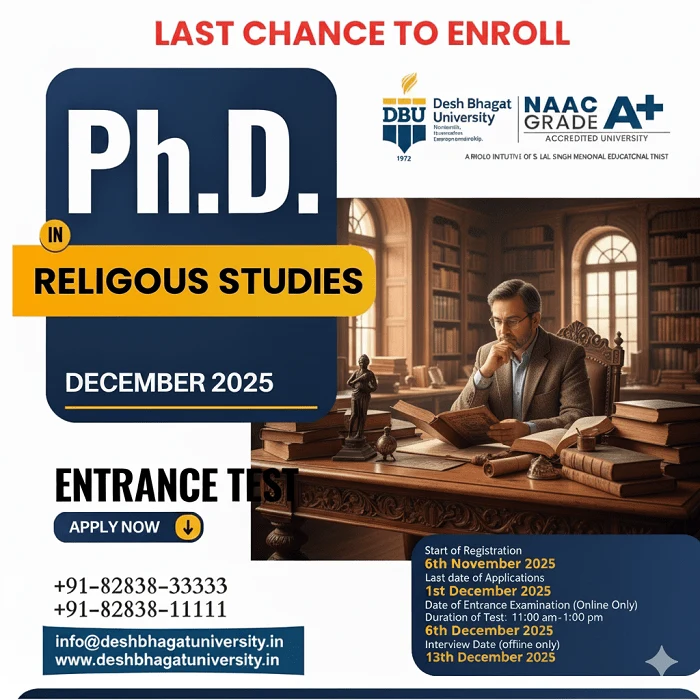PhD in Religious Studies in India – Course, Jobs, Admission 2026
November 7, 2025 2025-11-07 12:19PhD in Religious Studies in India – Course, Jobs, Admission 2026

PhD in Religious Studies in India – Course, Jobs, Admission 2026
What is Religious Studies?
Religious Studies is the academic field that explores religion in its many forms. It looks at beliefs, practices, sacred texts, traditions, ethical systems, and how religion influences individuals and societies. When you study Religious Studies, you try to understand why people believe, how they practice, and what impact religion has on culture and life.
At DBU, Religious Studies is listed as one of the many doctoral programmes under the Faculty of Social Sciences & Languages. This means students can research deeply into questions like: what role religion plays in society, how religious traditions evolve, or how religious beliefs affect modern issues.
Because of this broad scope, a strong foundation in Religious Studies can lead you into many directions—academia, policy, consultancy, cultural work, or ethical leadership.
PhD in Religious Studies — An Overview at DBU
If you are looking to take your highest academic step, DBU offers a PhD in Religious Studies. Here are the key details:
- Duration: The minimum time is 3 years, and the maximum time is 6 years.
- Eligibility: As per DBU’s guidelines:
- A Master’s degree (or professional equivalent) with at least 55% marks (or equivalent grade) is required. For candidates belonging to SC/ST/OBC (non-creamy layer)/Differently-abled or EWS categories, a 5% relaxation (i.e., 50%) is allowed.
- If you have passed M.Phil. with at least 55% marks (or equivalent grade), you are also eligible.
- Admission Process: DBU uses a two-stage process:
- Stage I: A PhD entrance exam with four sections: Research Methodology (30 marks), English (15 marks), Computer knowledge (15 marks), and subject knowledge (40 marks). No negative marking.
- Stage II: An Interview (or presentation) where the candidate discusses their research interest/area. The interview assesses whether the candidate has the competence, whether the research can be done at the institution, and whether the proposed area adds new knowledge.
- Coursework: There is a mandatory coursework for one semester after admission. If you have done an M.Phil. In regular mode and covered research methodology, you might be exempted.
- Recognised Scope: DBU highlights this programme under the list of PhD areas in the guidelines document, so it is officially part of their doctoral offerings.
Why Choose a PhD in Religious Studies in India
Choosing to pursue a PhD in Religious Studies in India—and specifically at DBU—offers several advantages:
- Rich religious and cultural context: India is home to many religions, traditions, and their interactions. Studying Religious Studies here gives you a living laboratory of religious diversity and change.
- Growing academic and research opportunities: Universities like DBU are expanding their research programmes. DBU lists Religious Studies among its PhD options, which shows the university’s commitment to the field.
- Flexibility of the degree: A PhD in Religious Studies is not just for becoming a lecturer or academic. It opens doors into many sectors.
- Long-term development: Doctoral-level research allows you to develop critical thinking, original research skills, writing, and communication—all valuable in many contexts.
- Institutional backing: At DBU, the structure is clear—eligibility, duration, and admission process are all laid out. This clarity helps you plan.
What Can You Research in Religious Studies at DBU?
Here are some research areas you can explore:
- Comparative religions (e.g., Hinduism, Islam, Christianity, Sikhism, Buddhism)
- Religion and society (how religion interacts with culture, politics, economics)
- Religion and ethics (moral issues, modernity, secularism)
- Sacred texts and traditions (interpretation, meaning, modern applications)
- Religion in modern contexts (digital religion, media & religion, migration & religion)
Since the guidelines ask you to prepare a research proposal and be able to conduct research that adds new knowledge, you should pick a unique topic and get a supervisor who is interested in your area.
Jobs with a Religious Studies Degree
Once you complete a PhD in Religious Studies, especially from a university like DBU, you have many possible career pathways. Here are some:
- Academic / Lecturer / Professor: Teaching in universities or colleges, supervising future scholars.
- Researcher or Policy Analyst: Working in think-tanks, research institutes studying religion, society, and culture.
- Cultural Heritage Manager: Managing museums, cultural projects that deal with religious artefacts, and traditions.
- Ethics Consultant / Advisor: Helping organisations deal with ethical or inter-religious issues.
- Media & Communication: Working on content related to religion, social impact, documentaries, and publications.
- Non-Profit & NGOs: Organisations working in community development, inter-faith dialogue, and social justice often need people who understand religion well.
- Government / Civil Services: With a deep understanding of religion and society, you can contribute to public administration, social welfare, and policy bodies dealing with culture and religious affairs.
- Writer / Author / Public Speaker: Publishing books, writing articles, speaking on religion, culture, and society.
Because the PhD gives you high-level research and analytical skills, you are not limited to traditional “religion only” jobs. The skills are quite transferable and in demand.
Why DBU’s PhD in Religious Studies Stands Out
Here are some special strengths of doing your PhD in Religious Studies at Desh Bhagat University:
- The programme is officially recognised in the university’s guidelines. That means you are enrolling in a formal doctoral track.
- The clear structure (3-6 years, coursework, entrance test + interview) means you know what to expect.
- DBU offers a research-friendly environment.
- Being in India provides you with a cultural context rich in religious diversity – especially useful for Religious Studies research.
- The eligibility criteria and admission process are transparent: a Master’s degree, minimum marks, an entrance test, and an interview. So you can prepare accordingly.
How to Prepare for the PhD Application at DBU
If you are thinking about applying for the PhD in Religious Studies at DBU, here are the steps you should follow:
- Check eligibility: Ensure you have a Master’s degree (or equivalent) with a minimum of 55% (or 50% if eligible for relaxation).
- Prepare your research proposal: Identify a unique topic in Religious Studies, frame your research questions, and outline methodology. The DBU interview will assess your research plan.
- Entrance test preparation: You will need to cover research methodology, English, functional computer knowledge, and subject core knowledge.
- Interview preparation: Be ready to present your research interest, explain why you picked it, how you will conduct it, and how it contributes to knowledge.
- Understand coursework requirement: After admission, you’ll do one semester of coursework unless exempted (if you hold a regular M.Phil with research methodology).
- Check duration and progression: Know the minimum (3 years) and maximum (6 years) timeframe. Plan your timeline and milestones accordingly.
- Budget and logistics: While exact fees for each discipline aren’t always given in the guidelines, you should check DBU’s admissions portal for session fees, scholarships, and funding options.
- Choose supervisor/department: Make contact with faculty in the Religious Studies area, and ensure they can guide your research.

Challenges and Things to Consider
- Conducting original research is intense and demands sustained focus for years.
- You’ll need to contribute something new to knowledge—not just repeat existing work. DBU emphasizes that your research must “contribute to new/additional knowledge”.
- You should select a clear, manageable research topic and plan realistic milestones.
- Be ready for coursework, writing a thesis, defending it, and publishing papers.
- Funding and resources: Make sure you understand what DBU provides in terms of library, research access, supervision, and possible fellowships.
- On successful completion, you’ll need to think about what you’ll do next—whether staying in academia or moving into other roles.
Final Thoughts
A PhD in Religious Studies is a deep dive into one of humanity’s most meaningful dimensions—religion, belief, ethics, culture, and how they shape lives and societies. Choosing to do this at Desh Bhagat University in India means you’ll have an officially recognised programme, clear guidelines, and a culturally rich environment for your research.
Whether you aim to become a scholar, a cultural consultant, a writer, or a social policy expert, this kind of degree arms you with strong research skills and a broad perspective, which are valuable in many jobs with a Religious Studies degree.
If you are passionate about exploring questions such as “Why do religions matter?”, “How does belief shape societies?” or “What is the role of religion in modern life?”, then the PhD in Religious Studies at DBU is a strong option to consider.
FAQs
1. What is Religious Studies?
Religious Studies is the academic study of religion. It helps us understand different beliefs, traditions, and the way religion shapes people’s lives and societies. Students learn about sacred texts, faith systems, rituals, and ethics. It is not about promoting any single religion but studying all with respect and curiosity.
2. What is a PhD in Religious Studies?
A PhD in Religious Studies is the highest academic degree in this subject. It involves deep research on topics like religion and culture, inter-faith dialogue, or philosophy of religion. Students study for several years, write a detailed thesis, and present new ideas that add to existing knowledge about religion and society.
3. Why should I study a PhD in Religious Studies at Desh Bhagat University?
Desh Bhagat University offers a recognised PhD in Religious Studies with clear rules and helpful faculty. The university provides a peaceful academic environment and a structured process that follows UGC guidelines. Students benefit from expert supervision, a rich cultural setting in India, and a supportive research atmosphere that encourages original thinking.
4. What is the eligibility for admission to the PhD in Religious Studies at DBU?
To apply, you must have a Master’s degree or an equivalent qualification with at least 55% marks. For reserved categories such as SC, ST, OBC (non-creamy layer), EWS, and differently-abled candidates, a 5% relaxation is given. Applicants must also pass an entrance test and interview conducted by the university.
5. How long does it take to complete the PhD in Religious Studies?
At Desh Bhagat University, the PhD in Religious Studies takes at least three years to complete and must be finished within six years. The first semester includes compulsory coursework, followed by independent research. The duration depends on how fast you complete your thesis and fulfil the research requirements.
6. What is the admission process for the PhD in Religious Studies at DBU?
Admission happens in two stages. First, candidates take a PhD entrance exam that covers research skills, English, computer knowledge, and subject understanding. Then, shortlisted candidates attend an interview or presentation about their research topic. Both stages help the university check whether your research interest fits their academic focus.
7. What topics can I research in Religious Studies?
You can research a wide range of subjects such as comparative religions, ethics, spirituality, inter-faith relations, religion and modern society, sacred texts, or digital religion. The topic should be original and meaningful. With the help of your guide, you can focus on a theme that adds new ideas to the field.
8. What jobs can I get after completing a PhD in Religious Studies?
After earning this degree, you can work as a university lecturer, researcher, cultural consultant, policy analyst, or writer. You can also join NGOs, museums, or heritage organisations. The skills you learn—research, writing, and understanding society—are useful in education, media, public administration, and cultural communication fields.
9. Does Desh Bhagat University guide the PhD?
Yes, DBU assigns experienced supervisors to guide each student throughout the research journey. The supervisors help you choose your topic, plan research methods, write papers, and prepare your thesis. The university also provides academic resources, libraries, and workshops to support your progress at every stage.
10. Why is a PhD in Religious Studies valuable in today’s world?
In today’s global society, religion continues to influence politics, culture, and human relationships. A PhD in Religious Studies helps you understand these connections deeply. Graduates become thoughtful professionals who can promote peace, respect, and understanding among different communities while contributing valuable insights to education and policymaking.






